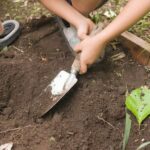Maintaining a healthy and productive vegetable garden requires effective pest control. Learning how to keep pests out of your vegetable garden naturally is essential to preserve your crops without using harmful chemicals. Pests can wreak havoc on your plants, leading to reduced yields and poor quality produce. By utilizing natural methods for pest control, you can protect your garden while also promoting a safe environment for yourself and beneficial insects.
Common pests such as aphids, cabbage worms, and tomato hornworms can quickly decimate your vegetable crops if left unchecked. These unwanted visitors not only damage the plants but can also introduce diseases that spread throughout the entire garden. Identifying these common pests is crucial in implementing the right strategies to keep them at bay.
Fortunately, there are numerous natural ways to deter pests from infiltrating your vegetable garden. Companion planting, DIY pest repellents, attracting beneficial insects, erecting physical barriers like row covers, and using organic pesticides as a last resort are all effective methods that do not pose any harm to the environment or human health. By incorporating these techniques into your gardening practices, you can create a pest-resistant ecosystem that promotes healthy plant growth and abundant harvests.
Common Pests in Vegetable Gardens
One of the key challenges that gardeners face when cultivating vegetable gardens is dealing with pests that can damage crops. By being able to identify these common pests, gardeners can take proactive steps to keep them out of their vegetable gardens naturally. Some of the most prevalent pests include aphids, caterpillars, beetles, and squash bugs. These pests can quickly multiply and wreak havoc on crops if not properly managed.
Aphids are small insects that feed on the sap of plants, causing leaves to curl and distort. Caterpillars are voracious eaters and can quickly defoliate plants if left unchecked. Beetles, such as the Colorado potato beetle, can devastate potato crops by consuming foliage and tubers.
Squash bugs can be particularly damaging to squash and pumpkin plants, piercing the stems and sucking out the plant’s juices. By learning to recognize these common pests, gardeners can take timely action to protect their vegetable gardens.
To keep these common pests out of vegetable gardens naturally, it is important for gardeners to adopt preventive measures such as companion planting, physical barriers, attracting beneficial insects, and using organic pesticides as a last resort. By implementing a combination of these natural methods for pest control, gardeners can effectively manage pest populations without relying on harmful chemicals that can harm beneficial insects and pollute the environment.
| Pest | Damages |
|---|---|
| Aphids | Curling and distorting leaves |
| Caterpillars | Defoliation of plants |
| Beetles | Consuming foliage and tubers |
Natural Methods for Pest Control
Keeping pests out of vegetable gardens naturally is essential to ensure a bountiful harvest of healthy crops. By utilizing natural methods for pest control, you can protect your plants without resorting to harmful chemicals that can be damaging to the environment and human health. Here are some effective ways to keep pests at bay in your vegetable garden:
- Handpicking: One of the simplest and most effective methods of pest control is handpicking. Regularly inspect your plants for pests like caterpillars, beetles, and aphids, and remove them by hand. This manual method of pest removal can help prevent infestations from taking over your garden.
- Beneficial insects: Encouraging beneficial insects like ladybugs, lacewings, and parasitic wasps can help keep pest populations in check. These natural predators feed on common garden pests, helping to maintain a balance in your garden ecosystem.
- Neem oil spray: Neem oil is a natural pesticide derived from the seeds of the neem tree. It acts as a repellent against a wide range of pests while also disrupting their growth and reproduction. Mix neem oil with water and a mild soap to create a spray that can deter pests from feeding on your plants.
Incorporating these natural methods for pest control into your gardening routine can help maintain a healthy balance in your vegetable garden ecosystem while effectively keeping pests out of your crops. By avoiding the use of harmful chemicals, you can ensure that your vegetables are safe for consumption while also promoting environmental sustainability in your gardening practices.
Companion Planting
One key principle behind companion planting is using plants that have complementary characteristics. Some plants emit chemicals or odors that naturally repel pests, while others attract beneficial insects that feed on harmful pests. For instance, planting onions or garlic near your carrots can help keep carrot flies away, as these pungent alliums mask the scent of the carrots from the flies.
In addition to pest control benefits, companion planting can also improve soil health by enhancing nutrient uptake and reducing soil erosion. The intercropping of different plant species can also maximize garden space and increase biodiversity, creating a more resilient and sustainable garden environment overall. By incorporating companion planting techniques into your vegetable garden, you can not only keep pests at bay but also promote the overall health and abundance of your crops in a natural way.
| Benefit of Companion Planting | Example |
|---|---|
| Enhances pest control | Marigolds with tomatoes to deter nematodes |
| Improves soil health | Basil with tomatoes for added flavor and pest deterrence |
| Increases biodiversity | Onions or garlic near carrots to keep carrot flies away |
DIY Pest Repellents
One effective way to keep pests out of vegetable gardens naturally is by using do-it-yourself (DIY) pest repellents. These homemade remedies are not only safe for the environment but also for the health of your plants and family. One popular recipe for a homemade pest repellent is a garlic and pepper spray.
To make this natural solution, simply mix minced garlic, chopped hot peppers, and a few drops of dish soap in water. Let the mixture sit overnight, then strain it and transfer it to a spray bottle. This potent concoction can help ward off common garden pests such as aphids, caterpillars, and beetles.
Another DIY pest repellent that can help protect your vegetable garden is a neem oil spray. Neem oil is derived from the seeds of the neem tree and has insecticidal properties while being safe for beneficial insects like bees and butterflies.
To make a neem oil spray, mix cold-pressed neem oil with water and a small amount of mild liquid soap to help emulsify the mixture. Spray this natural repellent on your plants to deter pests like whiteflies, mealybugs, and spider mites.
Additionally, you can create a simple citrus peel solution to keep pests at bay in your vegetable garden. Citrus peels contain compounds that repel insects, making them an effective natural pest control method. To make this DIY repellent, steep citrus peels in boiling water for several hours or overnight.
Once cooled, strain the citrus-infused water into a spray bottle and apply it generously to your plants. This fragrant solution can help keep unwanted pests like ants, slugs, and snails away from your precious crops without harming the environment or beneficial insects.
Attracting Beneficial Insects
To attract beneficial insects to your vegetable garden, consider planting a variety of flowers that provide nectar and pollen as food sources. This will help draw in pollinators like bees and butterflies, as well as predatory insects such as ladybugs and lacewings.
In addition to flowers, incorporating herbs like dill, fennel, and cilantro can also attract beneficial insects that prey on pests. Creating diverse habitats with different types of plants will encourage a wide range of beneficial insects to take up residence in your garden.
Another effective way to attract beneficial insects is by providing shelter and nesting sites. You can place bee hotels or insect houses strategically throughout your garden to offer refuge for pollinators and predatory bugs. Logs, rocks, and mulch piles can also serve as hiding spots for beneficial insects during the day. By attracting these natural allies to your vegetable garden, you can create a thriving ecosystem that helps keep pests out without resorting to harmful chemicals.
- Plant a variety of flowers that provide nectar and pollen
- Incorporate herbs like dill, fennel, and cilantro
- Provide shelter and nesting sites with bee hotels or insect houses
Physical Barriers
One effective method to keep pests out of vegetable gardens naturally is by using physical barriers such as row covers. These covers are typically made of lightweight material that allows sunlight, air, and water to pass through while creating a barrier that prevents pests from reaching the crops. By covering the plants with row covers early in the season, gardeners can protect their vegetables from flying insects like cabbage moths, aphids, and beetles without resorting to harmful chemicals.
Not only do row covers provide a physical barrier against pests, but they also create a microclimate that can help extend the growing season for certain crops. The covers act as insulation, trapping heat during cooler nights and protecting plants from frost. This extra layer of protection can be particularly beneficial for sensitive crops like tomatoes and peppers. Additionally, row covers can shield plants from extreme weather conditions such as heavy rainfall or hail, preventing damage to the crops.
When using row covers as a pest control measure in vegetable gardens, it is important to secure the edges of the covers tightly to prevent any gaps where pests can enter. Regular monitoring is also essential to ensure that the covers remain in place and are not damaged. By incorporating physical barriers like row covers into their gardening practices, individuals can effectively keep pests out of their vegetable gardens naturally while promoting a healthy and thriving crop yield.
Organic Pesticides
In conclusion, the key to maintaining a successful and healthy vegetable garden lies in practicing natural methods for pest control. By implementing strategies such as companion planting, DIY pest repellents, attracting beneficial insects, and utilizing physical barriers, gardeners can effectively keep pests out of their vegetable gardens without resorting to harmful chemicals. These methods not only protect the crops from damage but also promote a more sustainable and eco-friendly approach to gardening.
While organic pesticides may be considered as a last resort in extreme cases where natural methods alone are insufficient to control pest infestations, it is important to use them sparingly and selectively. Organic pesticides derived from natural sources can be less harmful to beneficial insects and the environment compared to synthetic chemical pesticides. However, it is crucial to follow instructions carefully, apply them judiciously, and consider alternative solutions whenever possible to minimize their impact on the ecosystem.
Frequently Asked Questions
What Can I Use to Keep Pests Out of My Vegetable Garden?
There are several natural methods you can use to keep pests out of your vegetable garden. One option is to plant companion plants that naturally repel insects, such as marigolds or chrysanthemums.
You can also make homemade insecticidal soap using gentle ingredients like dish soap and water. Additionally, physical barriers like row covers or planting in raised beds can help protect your veggies from pests.
How Do I Get Rid of Bugs in My Garden Naturally?
Getting rid of bugs in your garden naturally involves a combination of strategies. You can encourage beneficial insects like ladybugs and praying mantises by planting flowers they love and avoiding chemical pesticides that harm them.
Another approach is to use natural predators like nematodes or predatory insects that feed on harmful bugs. Creating a diverse ecosystem in your garden can help maintain a healthy balance and reduce bug infestations.
How Do You Make Natural Insect Repellent for Plants?
Making natural insect repellent for plants is simple and effective. One common recipe includes combining water, garlic cloves, cayenne pepper, and dish soap in a spray bottle.
Another option is to mix essential oils like peppermint, neem oil, or citrus oils with water and a little liquid soap to create a repellent spray. Regularly spraying these solutions on your plants can help deter unwanted insects while being safe for your garden and the environment.

If you’re looking to get into vegetable gardening, or are just looking for some tips on how to make your current garden better, then you’ve come to the right place! My name is Ethel and I have been gardening for years. In this blog, I’m going to share with you some of my best tips on how to create a successful vegetable garden.





